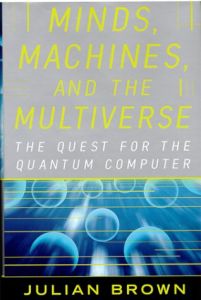Join getAbstract to access the summary!

Join getAbstract to access the summary!
Julian Brown
Minds, Machines, and the Multiverse
The Quest for the Quantum Computer
Simon & Schuster, 2000
What's inside?
How visionary do you want to be? How far out do you want to go? How about as far as parallel universes, self-replicating nanoassemblers and the unimaginably fast, sci-fi sizzle of the quantum computer?
Recommendation
If you’re the type of reader who loves to devour an entire book on a rainy day, you’d better wait for a Noah-size deluge before tackling Minds, Machines, and the Multiverse. Wet or dry, you will marvel at author Julian Brown’s encyclopedic knowledge. He uses charts, graphs and the occasional equation to try to make the inscrutable plain. However, unless reversibility, the Fredkin Gate and the von Neumann machine mean something to you, the essence of Brown’s narrative may elude you, beyond rough translation. He explains the possibility that the notion of alternative universes can be used to create a quantum computer that would be far more powerful than any computer heretofore. Brown persistently reveals possibilities that seem like dreams. getAbstract.com recommends his book to those who strive for news heights of techie theory or who think of physics as a hobby. Though fascinating, it may leave mere mortals feeling uncertain and somewhat overwhelmed.
Summary
About the Author
Julian Brown specializes in physics and computing as a science journalist. New Science Magazine has featured his work prominently, and he has produced science specials for BBC and BBC World Service. He teamed up with Paul Davies to edit The Ghost in the Atom and Superstrings: A Theory of Everything.


















Comment on this summary